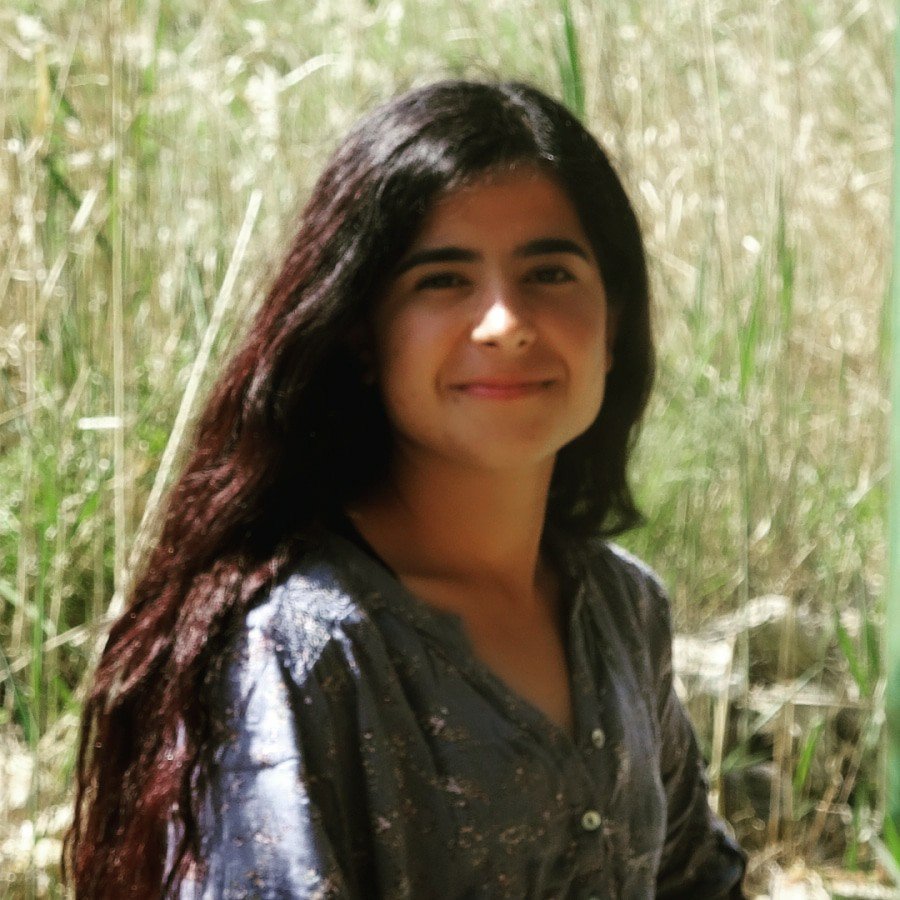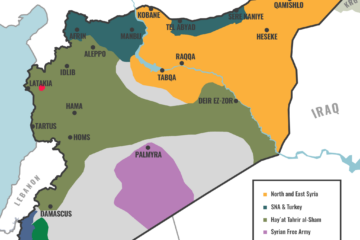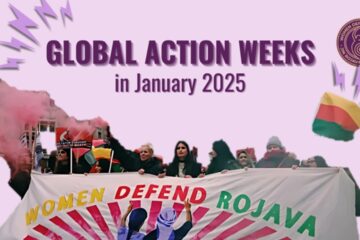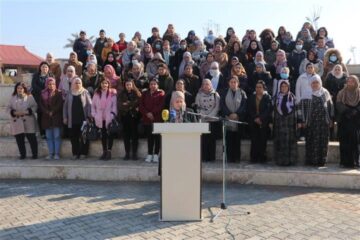
My name is Delila Axin, from Shengal. I am a Yezidi girl from Shengal, and a member of the diplomatic corps of the Yezidi Women’s Freedom Movement, TAJÊ (Tevgera Azadî ya Jin – Ezidî).
At the time of the genocide, I was 13 years old. I was a child. At that time, I didn’t understand what a genocide was. On the day the genocide started, we were at home. I was living in a village called Kuwoysi near Duhola village, where my family lived, some distance from the Shengal Mountains [Sinjar Mountains]. It’s an agricultural village, and we were working in the fields when we were told that there was danger, that ISIS were advancing on Shengal. We were all gathered in our village, and everyone was frightened, asking, ‘What will happen to us? If we go back home, will something happen to us or not?’
The genocide started at 3AM on 3 August, when ISIS started their attacks on Yezidi villages. ISIS killed anyone they caught, on all four sides of Shengal, in any town or village. They killed the men and took the women and girls, collecting them in one place. Day by day, hour by hour, we heard terrible news of more people being killed and abducted. I was young, a child, I didn’t know what genocide was. It can’t be easily expressed in words. As everyone knows, women and girls were bought and sold in markets, tortured. Many people killed themselves to escape this fate. Many children and old people died of hunger and thirst as they fled into the mountains, old people who could not walk in order to flee their homes were captured and beheaded by ISIS, burned. ISIS were barbaric, everywhere they went
These were historical and painful days, days of suffering, but also of resistance. The people of Shengal did not remain silent, they fought back.
These were historical and painful days, days of suffering, but also of resistance. The people of Shengal did not remain silent, they fought back. At that time, young Yezidi men armed with only light weapons carried out a valiant resistance, so that ISIS couldn’t enter those villages and the people could escape into the mountains. But as time went on, ISIS increased the strength of their attacks. Fighting continued until the morning, as everybody fled from their homes and into the Shengal moutains to protect themselves. Of course, my family did the same, along with everyone from our village.
From 2013 until 3 August 2014, Shengal had been under the protection of the Peshmerga, the military forces of the Kurdistan Region of Iraq, of the Kurdistan Democratic Party (PDK/KDP). But on the day the genocide started, the Peshmerga collected all their forces in the town of Shengal and when ISIS attacked, they ran away before the civilians did! They ran to Zakho, Duhok and Hewler (Erbil). When the civilians saw that the military force was running away before they did, they were shocked, they couldn’t believe it, that this armed force was fleeing before them. People said to the Peshmerga, « if you won’t fight, give us your weapons and we will fight instead. So that our land and our honour doesn’t fall to ISIS. » When the Yezidis said this to the Peshmerga, the Peshmerga killed them. Three of my relatives were killed by the Peshmerga, not ISIS, but the Peshmerga.
There was a great misery among the people in the mountains, they were hungry, exhausted. For our family, to give up on our land was something very hard. Like most people in Shengal, we had built up our land, our home, our fields and trees, with our own hands. And within a day, all of that fell into ISIS’ hands.
The impact of these events on my family remains until today. This is why we want to educate ourselves and improve in all areas, so these painful days don’t repeat themselves.
Yezidi society, in terms of its history, culture, religion and geographical situation, is an ancient society. We are the owners of a proud history, and we believe in nature. We have faced many attacks throughout our history. In Southern (Iraqi) Kurdistan, in Northern (Turkish) Kurdistan, in many Yezidi regions, we have faced genocides throughout history.
Our history is a history of suffering, of 72 genocides, and the genocide at ISIS’ hands in 2014 was like history repeating itself.
Our history is a history of suffering, of 72 genocides, and the genocide at ISIS’ hands in 2014 was like history repeating itself.
The biggest impact, and one which continues until now, is that many people are still lost. Scores of women were killed and their bodies never found. In Shengal and its countryside, there are scores of mass graves, each one filled with bodies of Yezidis slaughtered by ISIS. Mass graves with the bodies of hundreds of Yezidi people in them.
Until today, there are many Yezidis whose fate is not known, where they are, if they are still alive or not, if ISIS still hold them…
When one speaks of the resistance in Shengal, this must be remembered: When ISIS attacked the city of Mosul, it fell to ISIS. When they attacked Tel Afer, it fell to ISIS. When they attacked Baj, it fell to ISIS. In all the regions of Iraq, no force resisted against ISIS. They gave up all the regions to ISIS and fled. In Shengal, even though there was no military force left there, and even though there were no weapons, the people resisted, and many of them were martyred. We are proud of this resistance.
There were 12 members of HPC/YJA-STAR (PKK guerrillas) there in Shengal when the attacks started, who we call ‘the 12 knights of Derwish Abdi’. They wanted to prevent the genocide. They played a huge role resisting the genocide, especially at the beginning. But the Peshmerga fled in one direction and ISIS attacked from the other, and the genocide started.
A Kurdish force was fleeing on one side, leaving the Yezidis to ISIS: but another Kurdish force was coming to protect them. So the people found the strength to continue resisting themselves.
When HPC/YJA STAR came from the free mountains (Qandil) to resist the genocide, following commands from Murat Kariyalan, it built up the people’s morale. A Kurdish force was fleeing on one side, leaving them to ISIS: but another Kurdish force was coming to protect them. So the people found the strength to continue resisting themselves.
My family was among those who saw, during the genocide, that we had to protect ourselves. If we don’t protect ourselves, who will? When HPC/YJA-STAR and YPG/YPJ arrived from the mountains and from Rojava, they protected Shengal. They tried to prevent the genocide. By the time they arrived, the genocide had already started, thousands of people had been killed. But until today, that resistance is continuing.
The women who have fallen into ISIS hands faced much suffering, continuing until today. Thousands of women have fallen into ISIS’ hands, but they have also carried out a great resistance. There is Martyr Jilan, Martyr Zehre, Dayike Gule… these are all women who carried out a great resistance in order not to fall into ISIS’ hands. Dayike Gule fought with a pistol, and was murdered by ISIS. These are our examples, as Yezidi women and as members of the Yezidi Women’s Freedom Movement, these things have influenced me and our society as well.
The mountains were surrounded, and people resisted on all sides so that ISIS couldn’t reach the mountains, Yezidi people on one side, HPC/YJA-STAR on the other, women on another. This created a deep impact on our society. Among great suffering, a great hope emerged. Our society emerged from the genocide, and changed itself. It organized itself and protected itself.
After the genocide, a great change was created in Shengal, and those who led this change were women.
After the genocide, a great change was created in Shengal, and those who led this change were women.
In response to the genocide, for the first time, Yezidi women created their own armed force. In 2015, the Yezidi women who stayed in the Shengal Mountains and resisted, throughout summer and winter, through arduous conditions, realized that they had to organize themselves. They served as the vanguard force in changing and organizing society.
These groups were organized first in the name of YPJ-Shengal (Women’s Defense Units – Shengal), and started fighting. Women also started to organize themselves in society, such as in the Meclisa Jinên Ezidî (Yezidi Women’s Council). These changes started slowly following the genocide. Now we have our women martyrs that we commemorate, their resistance serve as an example and inspiration to the Yezidi people. This was also a big change.
Women, like Heval Ezda, who were liberated from ISIS, took their place in the women’s defense forces, and returned to the city in which they were raped [Raqqa]. They came back to fight there, to exact their revenge. This is an example for everybody, for the whole world.
Other women have also become examples. Yezidi women kidnapped by ISIS were sold in the markets of Raqqa, like Heval Ezda, who were liberated from ISIS and took their place in the women’s defense forces. They returned to the city in which they were raped, they came back to fight there, and exacted their revenge. This is an example for everybody, the whole world.
The women’s movement in Shengal, likewise, is an example for all Yezidi women. YJŞ serves as an answer to the genocide, a promise for the revenge of Yezidi women, and it continues in this path until today. In YJŞ, Yezidi women see the manifestation of their will and the defence of society through the YJŞ and YBŞ (Shengal Resistance Units, male equivalent to the Shengal Women’s Units). These are Yezidi youths, men and women, who protect their own society.
As for the situation of women, as Shengal was slowly liberated from ISIS, the people who had been driven out as IDPs and refugees to Rojava and Iraqi Kurdistan returned to their homes. They didn’t leave the region empty. And they rebuilt Shengal through their efforts, without any help from outside. They did it with their own will and belief.
The conviction of women was at the forefront in this process. Women organized under the umbrella of women’s council, in all fields: in education, in organization, in the unity of society, in the defense of society. With their strength, they rebuilt society and spread strength and belief in the society. The suffering of the genocide made us stronger, it was a source of strength.
There are special women’s academies all over Shengal now, military and civilian academies, and women are being trained there right now to lead our society. In this way we can change our society, with the leadership of Yezidi women.
Shengal is building itself up on this basis. This serves as defense against further attacks, both physical assaults and other, psychological attacks. The organization of women in Shengal serves to lead the reconstruction of society there.
When we speak of these changes, we must remember that they were achieved through the thought of Abdullah Öcalan. His ideas were a ray of hope to us, a flame in the middle of the genocide, which enabled our society to change ourselves. These changes are still going on, thanks to Öcalan.
Now, as women, we see it as our responsibility both to continue protecting Shengal and to carry out these changes in our society. There are special women’s academies all over Shengal now, military and civilian academies, and women are being trained there right now to lead our society. In this way we can change our society, with the leadership of Yezidi women. This gives strength in turn to women in Kurdistan and the regions around Shengal. It is a source of freedom and morale.
The role of YJŞ in the defense of Shengal and its women is a fundamental one. Now people can sleep secure in their beds at night, without fear, because they know that there is a force which will protect them.
In order to prevent another genocide, and to protect women and society, YJŞ organized itself and took up the gun. They fought against the enemy, not only with the gun, but also on the mental or psychological level. In both fields, they educate themselves and organize themselves, within civil society and within their armed forces. The role of YJŞ in the defense of Shengal and its women is a fundamental one, so that people can sleep secure in their beds at night, without fear, because they know that there is a force which will protect them. They are the sons and daughters of this society, who took up the gun to protect their own society and organize themselves.


